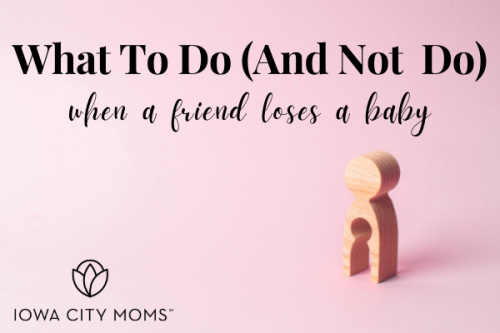You may have heard by now that October is Pregnancy & Infant Loss Awareness Month. If you’ve lost a child at any point (before, during, or after birth), then you already know the importance of shining a light on this topic. However, if you have not experienced the loss of a child, then you may find yourself a bit uncomfortable when this topic comes up. This is totally normal. In fact, it’s not just normal—it’s understandable. Loss and grief are hard topics to talk about in general—add in the fact that these are children and babies, and the hard factor increases tenfold.
Here at Iowa City Moms, we have always tried our best to save space for the loss mamas in our community, whether it be through our monthly in-person support group and online resources, sharing our stories via blog posts and social media spotlights, or just plain trying to do better when it comes to talking to loss moms (and dads) about the children they’ve lost. As a result of our efforts, and alongside the beloved members of our loss moms group, we have compiled a list of things to do or say (as well as things not to do or say) when a friend or loved one experiences this type of loss. We hope that you find it helpful when trying to walk alongside someone you love during this hard time in their life.
DISCLAIMER: I know it’s hard to convey tone across a computer/phone screen. With that in mind, I’d ask you to read all of these words as helpful, not judgmental. If you have said or done anything on these “what not to say/do” lists, we get it. We really do. In fact, many of us loss moms have admitted to each other that we said or did these things too before we had gone through this experience. In the words of Maya Angelou, “Do the best you can until you know better. Then when you know better, do better.”

What To Say When A Friend Loses A Baby
“I don’t know what to say.”
Contrary to popular belief, it’s actually OK to say “I don’t know what to say”. It’s an honest statement, and although somewhat ironically, it conveys the depth of what you want to say by saying that you just aren’t able to put it into words. In fact, it can actually be extra comforting to know that our loss is so big that it’s hard to think of the words to say. It feels that way for us, too.
“I’m so sorry for your loss.”
This one seems obvious, but more importantly, the words are the period at the end. No need to elaborate, no need to add anything. When someone loses a parent or a spouse or a grandparent, these are the words we use. When a woman has experienced a miscarriage, stillbirth, failed adoption, or other child loss, she wants to feel that her loss is just as meaningful.
“I’m here for you.”
Be careful throwing this one around; if you say you’re here for them, please actually mean it. These words can be so powerful when said with intention; a loss mom can feel so much support and love from these four words when they know that the speaker really truly will be there when she needs them.
“This is sh*t. I’ll bring the wine/ice cream/their favorite treat.”
Profanity almost seems fitting in this type of situation, doesn’t it? Strong language for a strong, strong emotion. Child loss really is just sh*t. That’s all there is to it. Saying that out loud, without a follow-up hopeful comment, is powerful—especially in the beginning. “This is so unfair.” “This sucks.” “This is just not the way things should be.” Oh, and don’t ask what you can bring—just make it a statement and bring it. Just do the work for them. It will mean so much to them that you took the initiative instead of making more work for them in a time where every little decision is really, really hard.
What To Do When A Friend Loses A Baby
Put it on your calendar.
After 6 years of hosting a monthly support group, I can tell you that 100 percent of loss moms have memorized dates associated with their loss. Due dates, loss dates, birthdates, would-be dates, etc. If you know the dates, write them down. If you don’t—ask them. When the dates come around, make it a point to send them a text or even a written note/card and let them know you’re thinking of them.
**Note: Many moms say that they do prefer a text to a call, as phone calls kind of put them on the spot and they may be at work or somewhere else that they aren’t comfortable getting upset.
Say their babies’ names.
Time and time again I’ve heard people say, “I’d like to bring it up, but I don’t want to make the mom upset.” Believe me, you are not making them upset. You are not reminding them that they lost their child—they are already thinking about them. I try to think about it this way: if their child were living, would you ask about them? Would you ask about what grade they’re in, which sports they’re playing, what college they’re planning to go to? Of course, you would. And when you’d ask, you’d say their name. And this mom wants to know that people remember not only their living children (if they have them), but also the one who isn’t in the holiday photos or wearing the back to school outfits. They existed, and they were, and are, a part of their family. Say their names and watch the smile that comes across their mom’s face when you do.
Cook them a meal/mow their lawn/grab their groceries/take them coffee.
Notice there’s a word missing there: offer. These are actions, not just words. We’ve all been there, haven’t we? A loving friend calls or texts and says “I’m happy to make you a meal, just say the word!”. And we never, ever say the word. It’s hard. It’s uncomfortable. Honestly, it sometimes feels like yet another thing to add to our list. But if you don’t offer, and instead just take action, then it just feels like love. A home-cooked meal (or store-bought!) dropped off on the porch, coming home to a mowed lawn or a shoveled driveway, gosh that can mean so much, can’t it? When times are hard and every little thing feels impossible, these tangible actions can mean so, so much.
What Not To Say When A Friend Loses A Baby
Anything that starts with “at least”.
(“At least you’re still young, at least you know you can get pregnant, at least you have other children, at least it was an early loss..”) Trust me, nothing that follows those words will be comforting to a mom who has just lost her child, no matter how far along she was or what the circumstances may be. If you find yourself starting a sentence in this way, please consider saying something else.
Telling other people’s stories.
This is a common response when a loss occurs, and honestly, I get it. Our brains make the connections and we try our best to make our friend feel better by sharing a hopeful story. “my friend had a miscarriage and then went on to have three healthy kids”, “so-and-so’s sister couldn’t get pregnant for years and years, but last year she got her miracle baby!”, etc. When you aren’t the one experiencing the very real heartbreak of loss, these stories truly do seem hopeful and optimistic. But when you’re in the depths of despair and you have no idea if you will ever get pregnant or if you will ever carry a baby to term, these stories are only more examples of people who already have what you’re so desperately longing for. It can be really, really hard to hear them.
“You can always adopt.”
This is not only offensive to a mom who is grieving a loss, but also to adoptive moms and adopted kids everywhere. Adoption is not a “last resort”. And also, adoption brings its own hard/challenges, even when all parties are trying their hardest to do what’s right for the child. And lastly, as members of our very own group can tell you, adoption too can end in loss and heartache.
NOTHING.
A few weeks ago I was listening to a podcast and a mom who had recently lost her baby said something along the lines of “there’s nothing you can say that will make it any better, but saying nothing makes it worse”. Truer words may never have been spoken. While there are no magic words we can say to a mom going through loss, not saying anything at all can be super, super isolating for her. Multiple times I’ve met women who’ve described the feeling of going back to work after a miscarriage or walking into church for the first time after their baby was born stillborn, and everyone just looks down or turns around or (almost worse) just acts as nothing has happened and everything is normal. This mom has experienced the unthinkable: the loss of a child. Not acknowledging this loss, while not intentional, can really feel like you are ignoring what has happened to her. We know it’s uncomfortable; we really do. It’s uncomfortable for us too. But the more we talk about it, and the more we start to acknowledge the hard and ask about it anyway, the less uncomfortable it will be for loss moms and their friends and family in the future.
What Not To Do When A Friend Loses A Baby
Pass judgment.
“I cannot imagine going through what she’s going through.” We’ve all said it. But, in fact, it’s actually natural to do just that. When something horrible happens, we wonder what we would do if it were us. And there’s nothing wrong with that. But every human on this planet is different—we come from different places and different families, we have different beliefs, and we walk through our lives with different lenses because of it. So when a friend loses her baby and decides it’s just too hard to have a funeral, don’t judge her for it. Maybe you would insist on a funeral if it were you. Or maybe a friend has an early miscarriage and decides to have a memorial, but you think that it’s awkward and you just couldn’t do that if it were you. But remember: it’s not you, and it’s not your story. Please respect them and remember that they are experiencing the unthinkable right now. Whatever decision they make is the right one, because it’s their baby and their family. Our role is to support them and to do so with empathy and compassion.
Get offended.
You may feel like you’re doing everything “right”. You offered to get her groceries. You called and asked her to go to coffee. You even offered to drive her to the cemetery on his birthday and sit there with her. But she never got you the grocery list, and she didn’t ever pick a date for coffee, and the night before the trip to the cemetery she texted and canceled. Friend, none of this is about you. You are trying your best, and that’s all you can do. Please do not be offended, and even more importantly, please don’t stop trying. If you don’t have a lot of free time in your schedule for canceled coffee dates or get-togethers, consider just dropping off a gift card and a little note of encouragement. If you don’t know what groceries she needs, try a quick bread/milk/eggs/fruit run and leave it on the porch. Maybe even make the trip to the cemetery alone—pick up a flower or a balloon and snap a pic to send her and let her know you went and visited her little one. Whatever you do, don’t take cancelations or unanswered messages personally. We promise it’s not you.
Forget.
Many of the moms in our loss group (myself included) are years past their loss. Our stories are no longer about the physical pain of the loss, or the early days of grief, or the fear of what may come next. Now, our hard is the forgetting. The fact that no one has said our baby’s name in 3 or 4 months, or they’ve completely forgotten that we had a miscarriage before we had our son or adopted our daughter. This is really, really hard. When you lose a parent or a grandparent, years down the road friends and family still bring them up. “Oh, how your dad would love to see all of these grandkids!” or “Can you imagine what Grandma would say if she could see this?” . . . Those types of conversations can, and should, start to enter the world of loss parents. “Max would be starting kindergarten this year, right? I wonder what he’d look like!”, “I know today is Maggie’s birthday. Remind me, how old would she be?” By continuing to write those dates on your calendar, and by saying their names and letting them know that you remember, you are giving them an irreplaceable gift.
Reader,
I want to thank you for taking the time to read this post. If you have a family member or friend who has gone through this loss, they are so blessed to have someone who loves them enough to read this and to try to do better to support them during this time. If you do not know anyone who has gone through this loss, I hope that this can be a resource if and when the time comes that you need to walk beside a loved one, coworker, or friend as they navigate this journey of grief. Statistics don’t lie: 1 in 4 pregnancies end in miscarriage. 1 in 160 pregnancies in the United States ends in stillbirth. Approximately 2,300 babies in the United States die of SIDS (Sudden Infant Death Syndrom) each year. Infant/child loss is, unfortunately, much more common than we think it is. If it hasn’t happened to you, it may happen to someone close to you. It may happen to your own daughter or daughter-in-law. And if it does, our hope is that you remember our words. That you remember the stories we’ve shared and the advice we’ve given. That you remember their babies with them, say their names, and that you truly, truly walk beside them on the journey. I promise you, no matter how small it may seem to you at the moment, they will be forever grateful.










